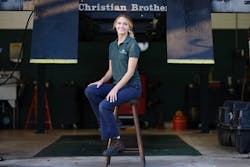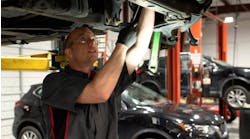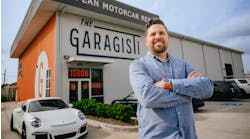SHOP STATS: Christian Brothers Automotive Hoover Location: Hoover, Ala. Operator: Brandon Fisher Average Monthly Car Count: 260 Staff Size: 7 Shop Size: $1.4 million Annual Revenue: $1.8
Brittany Schultz doesn’t look like your typical technician—and that’s the problem. The 24-year-old recently certified ASE master technician doesn’t see women represented in the industry. In fact, she has never met another female technician. With the growing problem of the technician shortage, it’s important to reach out to all interested parties and Schultz thinks the key to this is by breaking stereotypes and seeing representations of all different types of people working in automotive repair. She believes the more women see themselves represented in the field, the more interest they’ll have in learning more and will realize that it’s a viable career option, which will bring more people to the trade and help solve one of the industry’s biggest problems.
Schultz knew nothing about cars when she entered the field. She was studying business at a small Christian university and decided to take an automotive maintenance class to empower herself to do basic maintenance, like changing her car’s oil. That one class was enough to change her career path entirely. Schutz took another class and her instructors and leaders in the technical department encouraged her to change her major. She became the first woman at her school to graduate with an associates degree in automotive technology. Schultz has worked at Christian Brothers Automotive Hoover for two-and-a-half years and she says she’s having the time of her life learning new skills and exploring different opportunities.
I think my willingness to learn new things is an integral part of me being successful. I’ve met a lot of technicians or people who were training to be technicians that were getting into the field because they turned wrenches with their dad when they were little and didn’t give too much thought to it. I’m there because I want to be there. Another thing I’ve seen in the industry is people who are stuck in their ways and aren’t interested in learning new skills. My will to learn is desirable to employers.
When I came on at Christian Brothers, there was a shop foreman named William who took me under his wing. He helps everyone out but he was a big part in me getting the experience that I needed and answering the questions that I had in the beginning. He taught me the ropes.
In July, I received my master mechanic certification from ASE. A lot of my classmates took all of the tests right out of college, but I didn’t think I had enough experience to take all of them. Working at Christian Brothers helped give me the experience that I needed to start knocking those tests off my lists.
There are so many learning opportunities at Christian Brothers. We service all years, makes and models, both domestic and imports. I’m really interested in imports and electrical diagnostics and computer systems. I think this is another reason that I stand out—I’ve found that most in the field are not interested in these things. There’s a shift in the industry and now is a great time for women to get into the field. It’s not as much heavy lifting; there’s a new emphasis on electrical systems. There’s definitely a niche in the industry for women. For example, we’ve been seeing quite a few evaporator cores that require a dash removal. All of the guys hate it. It’s tedious and it takes a long time. I was willing to do one and I did it well. Now, they send all of that work to me.
There’s a different aspect to the way that repairs are done now. In our shop, when you look at a vehicle, you don’t just swap out the part. You have to write out and explain why the repair was done. I’ve found that women are a little more detail oriented. I cross all of my t’s and dot all of my i’s. I have less comebacks than all of my counterparts; my boss estimates that for my career it’s around 2 percent.
When a vehicle comes in, I’ll get the ticket with the write-up and from there we’ll verify a customer’s concerns. After we duplicate the problem, most of the work that I’m assigned is electrical. A lot of the time, I’ll use a scan tool to perform a test. After all of that is finished, I go into the office and do a write-up on the vehicle and what I’ve found and build the estimate myself and relay that information to the customer. Customers respond really well to hearing what’s wrong from the person who is actually working on the car.
The reason that I do this is because I’m a go-getter and I like working in different areas of the shop. I have good people skills and it’s unique to have a female in the shop that knows what she’s talking about. It’s an exciting thing for the customer. When I showed interest in this, my boss was more than willing to teach me the other side. It’s great because now I have training in the shop and behind the desk.
I’ve had a lot of people—because I’m a woman—think I’m better suited in the office. I’ve done very well selling to customers. However, I think it’s important for the trade to have women represented on the shop floor. I love doing hard labor.; it’s very satisfying at the end of the day. When I come home at night, I feel as though I’ve done hard work. In the next five years, I’m not totally sure where I’ll be. I want to stick with the hands-on tasks long enough to feel as though I’ve satisfied that chapter in my life. There may come a time in my life where I’m not physically able to do this, but I’m young still so I’m enjoying being in the non-air conditioned garage during the Alabama summer.
The more women are educated on the trade, the more I think they’ll pursue it. The more that they know about cars, the more opportunities within the field they’ll see. The more something is seen as abnormal—like a woman mechanic—the less inclined people are to pursue it. I think the key is to shed light on women who are doing this and are successful at it. Take me, for instance; I have great job security and I’m doing what I love to do. At the end of the day, automotive repair gives me a feeling of empowerment. I like learning new things that are challenging.
A Day in the Life: Brittany Schultz
—
Brittany Schultz’s day is hardly ever exactly the same. A typical day in her her life at Christian Brothers looks something like this:
7:30 a.m.-12:00 p.m: Schultz spends her morning diagnosing cars, building estimates, selling tickets and repairing vehicles.
12:00-1:00 p.m.: Around this time is when Schultz typically takes her lunch break.
1:00-6:00 p.m.: Shultz’s afternoon typically looks the same as her morning. She goes where she is needed as more work comes in. She occasionally will stay after hours to finish up vehicle repairs for that day.



